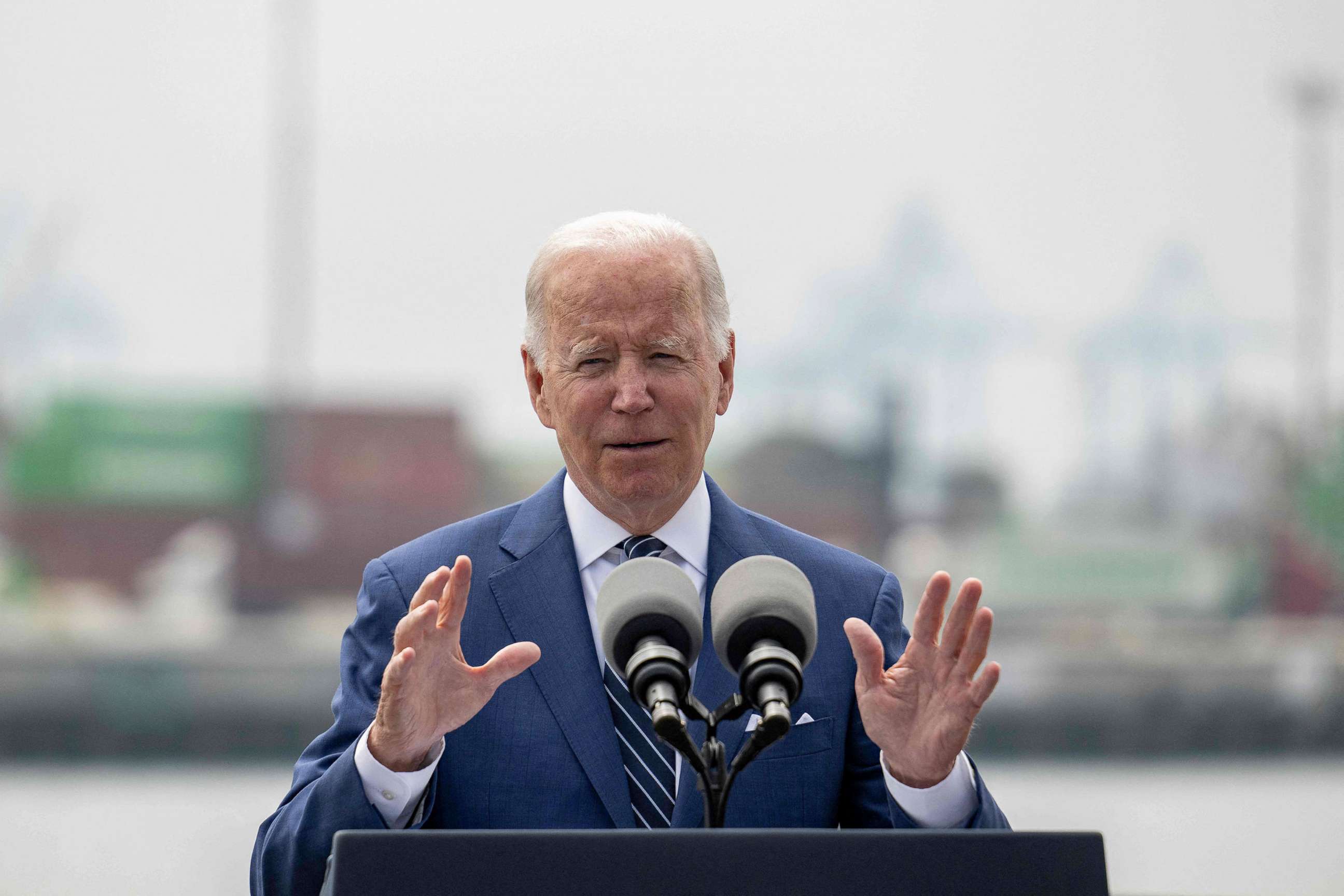Midterms are historically bad for the president's party. Now add inflation.
Will voters buy "Putin's price hike" or punish Democrats for the economic pain?
With inflation at a level not seen in four decades and food and energy prices skyrocketing, Americans experienced another blow when the national average price of gas this week reached $5 per gallon.
Responding to the news, President Joe Biden once again laid blame on Russia.
"It's outrageous what the war in Ukraine is causing," the president said Saturday.
The midterm elections are just 150 days away, and the Biden administration is doing everything it can to improve its standing with voters on the economy. The issue is a major risk factor in what would already likley be an uphill battle for the president's party, which tends not to fare well in the midterm cycle regardless of who is in power.
All this month, the administration will be making a "concerted effort" to talk about its accomplishments to date and plans to tackle inflation, a White House official told reporters.
"The job market is the strongest it's been since World War II," Biden said on Friday as he toured the Port of Los Angeles, before adding: "notwithstanding the inflation."
The president is touting the 390,000 jobs added in May, unemployment dropping to its lowest level in nearly 50 years and a reduction in the deficit.
But inflation climbed to 8.6% in May -- a significant increase from 8.3% the month prior -- and the result could spell a political nightmare for Democrats as they aim to maintain their narrow majority in Congress this November.
"It's the exception rather than the rule when the economy isn't a leading election issue, and it certainly is the leading issue this year," William Galston, the chair of governance studies at the Brookings Institute, told ABC News. "Every single poll indicates that it is top of mind for the American people."
In a new ABC News /Ipsos poll, 80% of Americans said inflation is an extremely or very important factor in how they'll cast their ballot this fall. Roughly three-quarters of Americans said the same about gas prices. Biden's approval rating on such issues were low: just 28% approve of his handling of inflation while only 27% approve of his work on gas prices.

Such numbers, compounded with the Democrats' historical disadvantage for holding the presidency, could spell trouble for the party.
In 1974, with inflation at 12%, Republicans lost 48 seats in Congress. Two years later, President Gerald Ford and his " Whip Inflation Now" campaign -- an unsuccessful effort to bring prices down -- also lost at the polls to Jimmy Carter.
High inflation persisted through the rest of the decade and early 1980s. Democrats lost 15 seats in the House in 1978 and Republicans lost 26 House seats in 1982.
"I'd say we're in a situation now, where the influence of the economy on the election is similar to what it was in the late 1970s and early 1980s," Galston said. "And I don't think that's a coincidence, because this is the first time in nearly 40 years that inflation has become a central issue for the electorate."
Perception vs. reality
The administration's anti-inflation push comes after officials spent much of the past year describing inflation as transitory. Treasury Secretary Janet Yellen told ABC's "This Week" in March 2021 that rising prices only posed a "small risk" to the economy. But on CNN earlier this month, Yellen acknowledged she got it "wrong."
Biden pledged Friday his administration will "continue to do everything we can to lower" prices, which he largely blamed on Russia's invasion of Ukraine.
"I understand Americans are anxious, and they're anxious with good reason," he said. "I was raised in a household when the price of gasoline rose precipitously, it was the discussion at the table. It made a difference when food prices went up."
But experts said there may not be much Biden can do to alleviate inflation.
"This particular economic situation is tricky," said Gabriel Lenz, a professor of political science at the University of California, Berkeley. "The best thing the president can do, or the only thing that the president can do, is to try to increase supply of various goods. But the president's ability in the short term to do too much on that front is quite limited."
On reigning in gas prices, Biden is pointing to his administration's two releases from the Strategic Petroleum Reserve. But Lenz said that has had little effect on gas prices, which have risen $1.70 since the beginning of the year.
The president is also calling on lawmakers to pass legislation to crack down on instances of price gouging and pass other measures to help families like lowering the price of prescription drugs, but that could prove difficult as much of his agenda has been stalled in the 50-50 Senate.
The House's Democratic majority overcame some internal opposition to pass legislation this week addressing high gas prices by cracking down on possible price gouging from oil companies. It's unclear whether the bill will in the Senate after all House Republicans opposed it.
"The Congress has to act," Biden said on Friday, "and they have been of late."
But Galston said once inflation strikes, "the scene of the action shifts away from the president, shifts away from Congress, towards the Federal Reserve Board."
Biden has vowed to let the Federal Reserve operate independently. The board is expected to meet this upcoming week, and raising interest rates again may be on the table.
"Americans should buckle up their seat belts because it's going to be a bumpy ride," Galston said.
ABC News' Justin Gomez and Lelee Ibssa contributed to this report.




